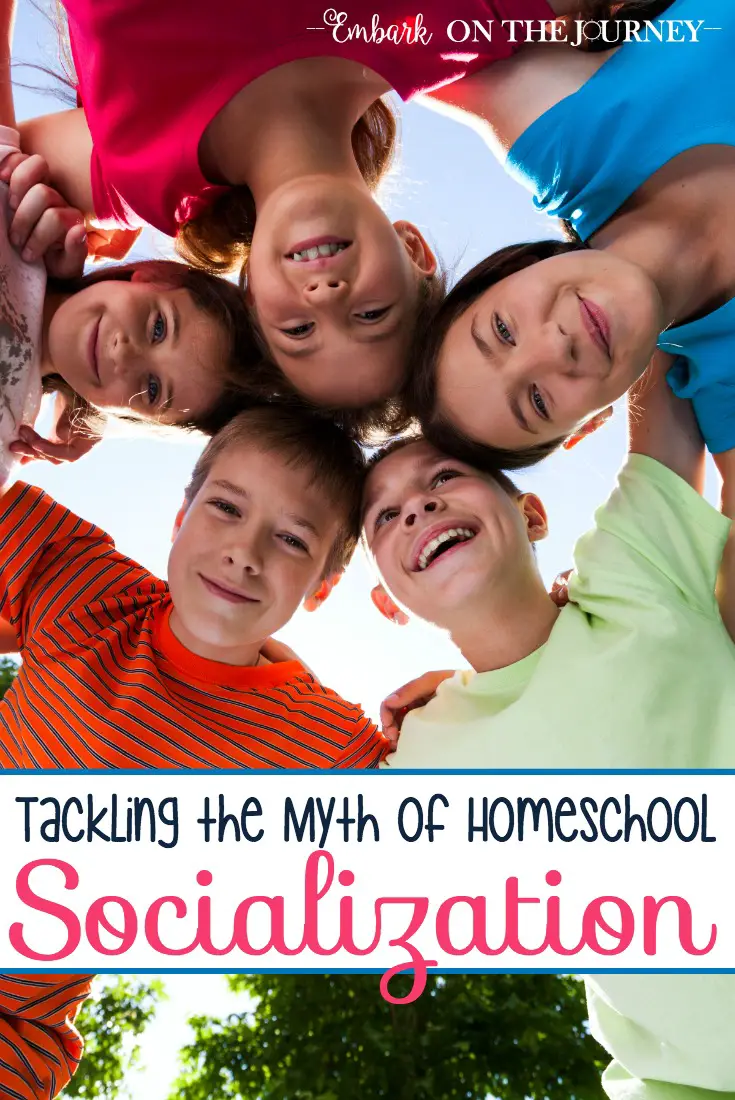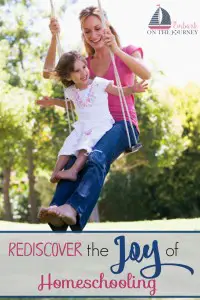Unless you homeschool under a rock, you’ve encountered the inevitable comments about socializing your homeschooled children. In the past fifteen years, I’ve lost count of the number of times I’ve heard “socialization” as an argument against homeschooling.
“You can’t shelter them forever,” some say.
“They need to learn how to deal with ‘real life’ eventually,” others say.
You know what? They’re right! However, creating parameters around when, where, and how my children must face what others call ‘real life’ is very important to me.
And, just what exactly is real life? Sitting in a classroom with 20-30 kids the same age where everyone does the same thing at the same time day after day?

Homeschool Socialization
Are my kids socialized?
They are! They are around other children all the time. Over the past fifteen years, they’ve participated in sports, scouts, youth group, Sunday School classes, dance classes, story time at the library, and more. Through all of these activities, they have the opportunity to interact with kids, teens, and adults. They can carry on an intelligent conversation with kids and adults alike.
Outside of the public school system, it’s not “normal” to be secluded with 20-30 same-age peers. In college, most classes are multi-aged. In the work force, they’ll be working and interacting with kids fresh out of college and those on the cusp of retirement.
In the natural environment of a sports team, dance class, or out and about in town, kids learn to share, take turns, stand in line, problem solve, and keep their hands to themselves. All of this should be learned outside a classroom setting. It’s real life.
My kids have had to work hard to earn a place on a team or a role in a ballet. They’ve had to learn to compromise in a group. They’ve learned to speak nicely to other, because it’s the right thing to do – not because it’s the class rule. Do they get it right every time? Nope. They don’t. But, life allows us to learn from our mistakes and try to get it right the next time. That’s the real world.
By attending classes and participating in group activities, kids are able to learn all the social skills they need to be productive citizens. Do they need ride a school bus or sit around the lunch table to be able to handle life outside my house? I think not. Nor do they need to know how to handle bullies and cliques in order to become strong people.
Homeschooling allows kids to be themselves. They can pursue their passions and hobbies. They can interact with a wide variety of people and ages and hone their social skills outside of the artificial environment a public school classroom creates.
[bctt tweet=”Unless you #homeschool under a rock, you’ve heard comments about socialization.” username=”homeschljourney”]
Where can you socialize your homeschooler?
Sports – Sports teach teamwork and discipline. My kids have built great friendships on the basketball court or the dance floor.
Scouts – My boys did scouts at our local church for many years. It was a great bonding experience for them as well as for my husband. They have created some lifelong friendships that started during the years they were in scouts.
Co-op – We attended a co-op for many years with some families we went to church with. We had park days {kids played, moms planned} throughout the summer, and then we met once a week through the school year for science class. The kids loved getting together with the other homeschooled kids, and I loved that they were getting instruction from an adult other than me.
Now, Emma attends co-op again. She looks forward to meeting up with her classmates each week, and she loves most of her teachers. I love that she has the opportunity to learn to take instruction from other adults besides myself.
PE Class – We attended PE classes for homeschoolers first at a local church and then at our local YMCA. Again, this was a new place to meet new kids who were also homeschooled.
Story Time – We loved our children’s librarian when Em was little. So, we attended Story Time every chance we got.
Library Programs for Older Kids – Many libraries across the country offer library programs for older kids – homeschooled or not. We’ve attended book clubs, movie nights, and more.
Volunteer work – We haven’t utilized this yet, but we are making plans to do so in the future. Homeschooling affords kids the time to do volunteer work. They can volunteer at soup kitchens, shelters, church nurseries, or shelving books at the library. They can also volunteer to follow their passions.
Em wants to be a vet when she grows up so she’s been talking to an adult friend who works at a dog clinic. She’s also talked to our vet about volunteering there. She just has to be 14. But, because we homeschool, we can set our eyes on that prize and work it into our schedule next year.
Your turn:
How do you answer questions about socializing your homeschooled kiddos?
If you enjoyed this post, you may also enjoy these:
 |
 |
 |

My children have had MORE opportunities to “socialize ” since we started homeschooling three years ago . My children were not allowed to talk to their friends at school, even at lunch. Now we have co-op, parties,field trips ( something else not included in public school), and my children hang out with friends . They have had a wide range of people and places to learn from.
I often wonder if people think we don’t ever let our kids out of the house when they ask that. One thing people seem to forget is that most children have friends in the neighborhood to play with. School isn’t necessary for that!